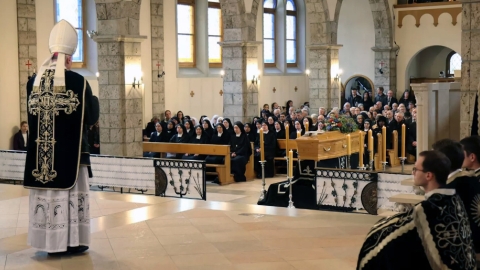The Duty to Support the Church

Widow's Mite, 6th century, Basilica of Sant'Apollinare Nuovo, Ravenna
Most Catholics know, at least intuitively when the collection basket is passed every Sunday, that they should give to the Church. What often remains unclear, however, is if there is a binding obligation to do so. Is giving to the Church like giving to a secular charity such as the Red Cross? And if Catholics have a duty to give, how much? Should they tithe (i.e., give 10% of their earnings) as Christians did in times past or rely on another metric altogether?
Early History
The Catholic duty to support the Church is expressed in nascent form in the first-century treatise on Church order, the Didache. Chapter 13 states: “Every first fruit, therefore, of the products of winepress and threshing-floor, of oxen and of sheep, you shall take and give to the prophets, for they are your high priests.” In the absence of a prophet, a term the text applies generally to an instructor in the orthodox Christian Faith, these fruits should be distributed to the poor. This command to give of one’s fruits is reinforced in Chapter 4 of the early 3rd century text, the Doctrina Apostolorum: “[S]hare everything with your brethren, and you shall not say it is your own. For if we are partners in what is immortal, how much more ought we to consecrate from it!”
As will be discussed more below, these foundational instructions would be developed over the centuries into what are known as the precepts (or commandments) of the Church. By the 8th century, for instance, St. Boniface was preaching on the importance of attending Mass on Sundays, keeping the Church’s fasts, and paying tithes. Tithing, which came to be inextricably linked with the Catholic duty to support the Church for nearly a millennium, eventually found a place in both canon and civil law.
Although problematic for other serious reasons, the current Catechism of the Catholic Church (CCC) reflects the ancient admonition to support the Church. It states that “[t]he faithful…have the duty of providing for the material needs of the Church, each according to his abilities” (2043). This statement appears as part of Article III, Chapter II, which concerns the Precepts of the Church, and is rooted in the 1983 Code of Canon Law’s (CIC) directive that “[t]he Christian faithful are obliged to assist with the needs of the Church so that the Church has what is necessary for divine worship, for the works of the apostolate and of charity, and for the decent support of ministers” (Can. 222 §1).
The Ancient Practice of Tithing
The current language used in both the CCC and CIC dimly reflects the far more ancient practice of tithing, which is the giving of “the tenth part of all fruits and profits justly acquired, owed to God in recognition of his supreme dominion over man, and to be paid to the ministers of the church” (Addis & Arnold, A Catholic Dictionary, p. 880 (Benzinger Brothers 1893)). Tithing is mentioned throughout the Five Books of Moses, that is the Pentateuch, and makes its way by implication into the New Testament through St. Paul’s admonition “that those who do the temple’s work live on the temple’s revenues; that those who preside at the altar share the altar’s offerings” (1 Cor. 9:13).
Following the peace of the Church brought forth by Emperor Constantine the Great’s Edict of Milan (313 AD), local churches and municipalities began legislating the obligation to tithe which was already deemed binding on the faithful as a matter of divine law. With the development of Christendom, the legal codes of Europe mandated tithing while allowing the Church to retain a portion of its produce as part of its upkeep.
Running concurrent with this positive legislation was the development of the Precepts of the Church, which today are often thought of it in terms of the obligation to assist at Mass on Sundays and Holy Days, go to confession once a year, and receive the Eucharist during the Paschal season. Providing for the material needs of the Church, which is today expressed in both the CCC and CIC, was historically framed as the faithful’s obligation to pay tithes throughout the Middle Ages and into the early modern period. With the onset of modernity and the rapid secularization of formerly Christian states, tithing disappeared from civil law, though some countries retained a so-called “church tax” for maintaining Catholic properties and institutions.
When Tithing Is No Longer Law
In recent times, the concept of tithing has come under scrutiny, with Catholic, Protestant, and Eastern Orthodox voices claiming that tithing was part of the Old Law and therefore no longer binding after the coming of Christ. This opinion ignores, however, the aforementioned legal institution of tithing in Western Christendom that existed largely uncontested for a millennium. Although Eastern Christendom did not develop the same system of tithing, Christian governments regularly provided for the maintenance of the Church through taxation.
Even if a strict obligation for the faithful to give 10% of their income directly to the Church has not existed uniformly throughout the centuries, that hardly means there was never an abiding duty for Christians to offer material support. Writing in the third century, St. Irenaeus says (Against Heresies 4:18:1):
We are bound, therefore, to offer to God the first-fruits of His creation, as Moses also says, ‘Thou shalt not appear in the presence of the Lord thy God empty;’ so that man, being accounted as grateful, by those things in which he has shown his gratitude, may receive that honor which flows from Him.
And the great orator and churchman St. John Chrysostom says the following in his fourth Homily on Ephesians:
So that in this case the greatness of the sin will make such a one go away with the devil. Woe to him, it is said, who doeth not alms; and if this was the case under the Old Covenant, much more is it under the New. If, where the getting of wealth was allowed, and the enjoyment of it, and the care of it, there was such provision made for the succoring the poor, how much more in that Dispensation, where we are commanded to surrender all we have? For what did not they of old do? They gave tithes, and tithes again upon tithes for orphans, widows, and strangers; whereas someone was saying to me in astonishment at another, ‘Why, such an one gives tithes.’ What a load of disgrace does this expression imply, since what was not a matter of wonder with the Jews has come to be so in the case of the Christians? If there was danger then in omitting tithes, think how great it must be now.
Indeed, as the Faith began to be preached in the Eastern Slavic lands, there was no doubt about the importance of tithing as evidenced by the 10th century Church of the Dormition of the Virgin in Kyiv. Commonly known as the “Church of the Tithes,” it was built and maintained by St. Vladimir the Great’s act of setting aside a tenth of his income and property. Similar acts of generosity led to the construction of churches throughout the East. In more recent times, immigrants to the “New World” constructed churches in North and South America by giving of not only their finances (oftentimes more than 10%), but their time and talents as well.
Supporting the Church Today
Although there is no longer a numeric benchmark for how much Catholics ought to give, the general loss of faith and fervency in the world has shifted the burden of supporting the Church to fewer and fewer souls. It is important for Catholics to prayerfully consider what they can give of their income to the Church so that subsequent generations can enjoy the fruits of Christendom. As always, when questioning how much one can prudently donate, the faithful should consult their confessor or pastor for discernment and guidance.





